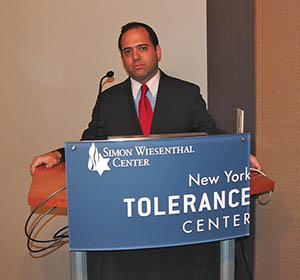



Englewood—Michael Cohen has been promoting tolerance and human rights since working for Congressman Edolphus Towns of the Congressional Black Caucus in the 1990s. Today, he is furthering that goal as the new eastern director of the Simon Wiesenthal Center, a global human-rights organization headquartered in Los Angeles. The New York office, which includes the Museum of Tolerance, is located at 226 East 42nd Street.
“No organization more epitomizes the goal of pursuing dialogue and building relationships with other communities than the Simon Wiesenthal Center,” said Cohen, who had served as a lobbyist for the center for the past three years. “My responsibility in the eastern tri-state region is to build alliances with other communities across the spectrum of religiosity, race and color.”
The Simon Wiesenthal Center teaches the lessons of the Holocaust by using multimedia tools, including documentaries and videos produced by Moriah Films, a division of the center. “We provide resources, tools for educators, using out-of-the-box ways and creative mechanisms to combat hate,” Cohen said. “We work with all groups; we’re not solely focused on the Jewish community. We have a history of working with everyone.” The Museum of Tolerance is open to individuals but Cohen said it is best experienced as part of a group with a docent who can explain, guide and use interactive tools to reinforce its message of tolerance.
One of the center’s most innovative programs is the Tools for Tolerance diversity training program for the NYPD and for the NYC Corrections Department. Cohen was instrumental in securing funding for the project and explained how it came about. “We had gotten feedback from law enforcement officers that there was a need to increase and improve the cultural sensitivity training that was currently provided. On one of the exit surveys from our training, an officer commented that while they were taught how to act from a physical standpoint, they welcomed the communication and interpersonal training provided by the center, as it significantly impacted the outcomes of their interaction with the public.”
Education is a potent way to both discipline and teach people who hate, Cohen said. He recalled an incident in an upstate New York school where several children were guilty of anti-Semitic actions. The school bused all the students to the Museum of Tolerance where docents took them through the exhibits and guided them to challenge their attitudes.
Getting Jewish students involved in government is another mission of Cohen and the Simon Wiesenthal Center. He wants to energize students to be active just as he and his generation were two decades ago. “I am looking forward to re-engaging our students to participate in government at a young age the way I did,” Cohen said. “Internships can help students develop relationships, and understand the process of getting things done. They can utilize those relationships when they want to lobby against anti-Semitism, advocate for Israel, or work with local officials to expand a shul.”
Cohen said as a young staffer to Congressman Towns he realized that there was a historical bond between the black and Jewish communities, and both faced similar issues, but the two sides weren’t communicating. Cohen helped initiate a Black/Jewish relations conference on Capitol Hill, bringing together the Congressional Black Caucus, Jewish members of Congress and each community’s national leadership organizations, to foster better understanding between the groups. “This allowed for positive working relationships, so you could call upon someone and effect change,” Cohen said. He secured Congressman John Lewis as co-host, then a noted civil rights leader who had preceded Martin Luther King Jr. when he gave his “I have a dream” speech during the March on Washington. Lewis said to Cohen, “We might have gotten here on different ships but we are all in the same boat.”
Shortly after beginning his new position earlier this month, Cohen attended the center’s annual dinner with keynote speaker Mehmet Sahim, a Muslim academic and social worker in Amsterdam who confronted anti-Semitism and, despite being threatened and forced to relocate, continued his commitment to justice. “Mehmet epitomizes the center’s mission,” Cohen said. “He is not an international personality; he is trying to do the right thing. Everyone needs to find their own personal way to combat that which is wrong.”
With his new role as eastern director of the Simon Wiesenthal Center, Cohen has aligned his professional and personal approaches to fighting against intolerance and for justice. “I can’t remember a time I was so excited about what I do every day,” Cohen said. “It’s critical work and requires constant energy. But I’m using a lifetime of professional experience and I’m humbled by the opportunity.”
The recent terror attacks in Paris demonstrate that the center’s work is never finished and, now more than ever, hate must be stopped. Commenting on the attacks, Cohen said, “We, along with all who value humanity, are deeply affected by the terror attacks experienced in Paris last week. We mourn those who have been needlessly lost and can only assure their loved ones that we will work tirelessly to combat the hatred that fuels such abhorrent actions in all its forms and facets.”
By Bracha Schwartz










